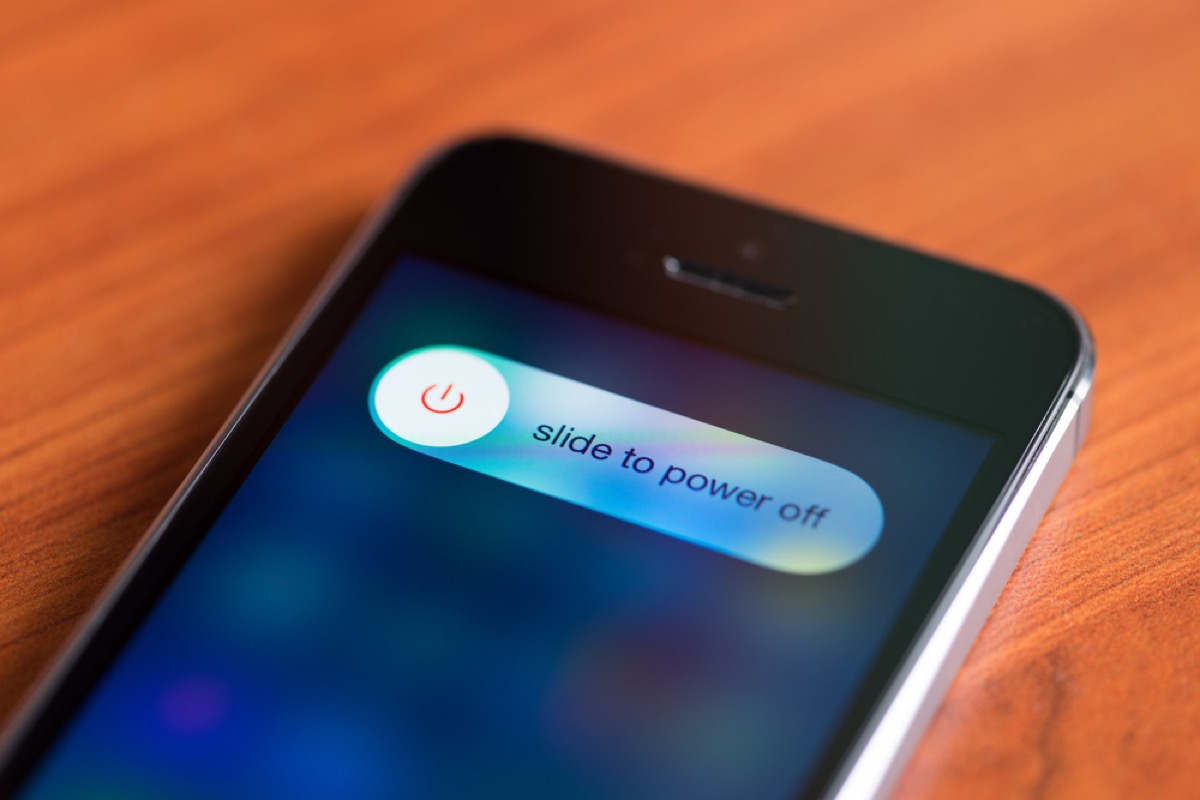33 Brilliant Ways to Stop Worrying So Much

Worrying is a natural part of being human. However, sometimes we can worry a little too much, even to the point that it starts to affect our everyday life. To help you combat this, we talked to therapists and mental health experts about their tips and tricks for worrying less and living more.
1
Make yourself unreachable for a period of time.

When you’re constantly on your devices, looking at your email or your busy calendar, it can be hard to get a true break from all the stress of everyday life, which just allows all your worries to pile up and fester.
“The constant distractions from work, friends, family, and app notifications negatively affect our ability to stay focused,” explains licensed mental health counselor Elena Jackson of Norwalk, Connecticut. “Our minds are constantly jumping from thought to thought. This jumping mimics the racing thoughts [that come with] anxiety.”
The solution? Set aside some time each day during which you are unreachable, whether that means powering down your devices or simply not looking at them. Taking that time to reset is pivotal when it comes to worrying less.
2
Start your day with a plan.

If you want to make sure your day is worry-free, make a conscious effort to start it off on the right foot. How? According to Jackson, creating a plan for the day as soon as you wake up can help you maintain control of your emotions.
“Most worry is about an uncontrollable situation. Therefore, planning the controllable causes you to be more prepared mentally to respond to any situation well. The more often you respond well, the more confident you feel,” she says. “Also, the predictability of a plan can balance the uncertainty that accompanies anxiety.”
3
Vocalize your worries and fears.

Bay Area-based licensed therapist and mindfulness teacher Joree Rose says that teaching her clients to vocalize their worried thoughts helps keep them at bay. “[These statements] allow you to see the thoughts and worry for what is is, and actually slows your reaction to it,” explains Rose. “It creates space between you and your thoughts, which are fueling the anxiety or fears, and helps you to choose a response to it rather than reacting impulsively to the thought.”
Taking a moment to say “I’m really worried right now,” or “My imagination is on overdrive and I’m having a hard time slowing it down” can make all the difference.
4
Just breathe.

As simple as it sounds, there’s a reason why breathing techniques are so often touted by therapists. “[Breathing] calms the brain and the body by activating the ‘rest and digest’ part of our brain; that’s the part of our brain that reminds us there is no real threat, and that we are in fact safe,” Rose explains. “This helps the heart rate to calm, the mind to come back into the present moment, and our overactive thoughts to slow down.”
5
Think about your worries in terms of the future.

When it comes to anxiety, people don’t often consider the long-term implications of what they’re worrying about—even though they should. That’s because implementing what psychotherapist Jennifer Weaver-Breitenbecher calls the “deathbed” theory can dispel a negative thought almost immediately.
“Ask yourself if it’ll matter on your deathbed. If the answer is ‘yes,’ then your anxiety is probably appropriate; if your answer is ‘no,’ then you need to move on,” the Rhode Island-based counselor explains. “It helps put stimuli for anxiety into perspective.”
6
Conjure up some positive memories.

Taking a few minutes to consciously reminisce about positive memories—whether related to your current worry or not—can actually put your mind at ease and put you in a more positive headspace.
In a 2016 study published in the journal Psychology and Psychotherapy, researchers from the University of Liverpool were able to prove that recalling memories associated with positive experiences can help generate positive emotions during a time of stress or worry.
7
Or imagine the worst-case scenario.

When the mind is full of worried thoughts, most people suggest steering away from negativity. And while usually looking on the bright side helps, licensed psychologist Wyatt Fisher of Boulder, Colorado, says that thinking about the worst-case scenario can actually help stop your worrying, too.
“Explore the worst-case scenario of what could happen with something you’re worrying about. Then, develop a concrete plan on how you would handle the situation if that were to occur,” he explains. “Developing a plan creates a sense of control and preparedness, which decreases anxiety over the worst-case scenario.”
8
Use the “so” method.

Worrying includes a lot of “what ifs”—and when you want to stress less, Fisher says you should write your “what if” worry down with a “so” in front of it. “Therefore, ‘What if I don’t get the pay raise’ turns into, ‘So what if I don’t get the pay raise?’ It’s a quick and easy way to lower anxiety and stop worrying,” he explains.
9
Write down what you’re grateful for.

Christine Scott-Hudson, a licensed psychotherapist and owner of Create Your Life Studio in Santa Barbara, California, says that instead of turning to social media as a way to “connect” to something while you’re feeling anxious, you should try connecting with yourself and your own life. Her method of choice? Gratitude.
“Starting a daily gratitude practice helps us to remember all that there is to be grateful for and it helps to reconnect back to yourself,” she says. “To begin a daily gratitude practice, simply write down two or three good things that you are grateful for every single night before you go to bed. Recalling the tiny happy moments helps you to put a bad day into perspective. Remembering just how much goodness you are so fortunate to enjoy can help you not let a bad day trick you into thinking that you have a bad life.”
10
Or jot down your thoughts in general.

Journaling is a go-to tool used by many therapists—and for good reason. “Writing things down can help you to look at your thoughts by actually seeing them on the page,” says Angela Ficken, the therapist behind Progress Wellness in Boston. “This allows you to create a dialogue between you and whatever is causing your anxiety. Making these thoughts visible helps you to remember them so that you can analyze them and replace them with more helpful thoughts and actionable steps.”
11
Hold an ice cube in your hand.

When you want to stop worrying, “use grounding techniques to ‘shock’ your system,” says Ben Barrett, a social worker who specializes in mental health in Muskegon, Michigan. “Take a cold shower or hold an ice cube in your hand and really focus on the water hitting your body or the ice cube in your hand.”
Specifically, Ficken suggests holding an ice cube in one hand over the sink and seeing how long it takes you to notice that you are not able to think about anything but how cold your hand feels. Focusing on other overwhelming and harmless sensations can give your brain a much-needed break.
12
Make a feel-good playlist.

“Make a playlist of songs that you like that evoke calm, hopeful, happy, or peaceful feelings,” Ficken suggests. “Play it regularly such as on the way to work, school, or home, at lunchtime, at night before bed, or at the gym and connect with the music and its calming effects. Then, any time that you feel anxious, or when you can predict that you may feel anxious, you can press play and know that you have this remedy set to go.”
13
Let go of the past.

Sometimes when you hold on to the past—especially to particularly painful memories, like a divorce—you can find yourself worrying about things you can no longer change. If this sounds like your situation, Scott-Hudson recommends a guided imagery technique she calls “rumination.”
“Think of a color that reminds you of the person with whom you are struggling to forgive. Take the color and imagine their head as a balloon of the same color,” she explains. “When you notice that you are beginning to recall the betrayal or offense, imagine you are holding a balloon of that associated color, and then, imagine releasing the balloon and letting it go.”
14
Learn to say no.

People often avoid saying no for fear of coming off as rude and selfish. But when you put too much on your plate and overload your schedule, all it does is lead to extra stress on your end.
“Taking on too many responsibilities can be a big contributor to stress and anxiety, and it can lead to complete burnout if left unchecked,” says Nina LaRosa, marketing director of Moxie Media, a training company that helps manage workplace stress, based in New Orleans. “Know that there is nothing wrong with saying no politely, but firmly, when needed. At work, your manager and coworkers will most likely understand if you have too much on your plate to take on another task or project. At home, your friends and family may be able to help you out while you tackle your stress or anxiety.”
15
Get organized.

LaRosa says that when you have a lot to do and no clear prioritization of tasks, it can cause unnecessary worry. To combat this issue, she suggests getting a work calendar and marking down the dates for all of your meetings, tasks, and deadlines, as well as using a task management tool to help with chores, projects, and activities at home.
“Once you have all your responsibilities in order, evaluate them honestly and decide what you need to prioritize first,” she says. “Once you have a clear plan of action, your anxiety may start to subside.”
16
Change your outlook.

Though worrying often causes negative thoughts, the reverse is true as well—that negative thoughts can cause worrying. That’s why if you want to stress less, LaRosa recommends looking at how you view things as one of the first steps in your healing process.
“In some cases, a negative outlook can contribute to anxiety and mood issues,” she says. “It’s hard to feel good when you are constantly thinking negatively. The first step is to recognize this tendency and any patterns of negative thinking. Remember that you can control your perception, and resolve to approach things with a more positive outlook.”
17
Mimic your laid-back friends.

You know what they say about faking it ’til you make it? Well, businessman Tony Arevalo of Portland, Oregon, says he mimics laid-back people as a way to alleviate his own anxiety.
“For instance, if you worry you’ll be late on your date with a friend, make sure you’re following how your laid-back friend is behaving, hoping you’ll develop the same, more relaxed, pattern of stress-free living,” he says. “Or just find a coworker who’s great under pressure and try to figure out how this coworker manages to finish a complex task without breaking a sweat.” Arevalo says that surrounding himself with people who are more carefree than he is has helped him learn about stress management.
18
Argue against your anxiety.

Sometimes it helps to personify your worry and actually argue with it. According to licensed psychologist Kahina Louis of Miramar, Florida, this allows you to look for evidence to go against your anxious or worried thoughts and ideally fight it off before it gets the better of you.
“Ask yourself, ‘Has this outcome happened before? Does this happen to everyone and every time in this situation? How likely is this outcome I’m worried about actually going to happen to me? What are the facts here?'” she advises.
19
Set aside time to worry.

No matter what, everyone ends up worrying about something it their lifetime. And if you have a particular concern on your mind—be it paying the bills or completing a big work project—then your best bet is to set aside some time to feel stressed.
“It might sound counterintuitive, but setting aside time to worry allows you to worry with intention,” explains Adina Mahalli, a mental health consultant for Maple Holistics. “This can help to curb your time spent worrying. Regardless of the time of day you choose to worry, limit it to a five to 10-minute time slot. Once you’ve scheduled this time, you will hopefully be able to gain better control and clarity over your worrying thoughts.”
20
Shift your perspective.

J. Marie Novak, founder of the website Believe and Create, writes a lot about how to alleviate worrisome thoughts in her book How to Kick Your Worry Habit and Just Be Happier. Her best tip, however, is short, sweet, and simple: Change your perspective.
“Worriers get stuck in the same old patterns brought on by always seeing life from the same old perspective,” she says. “It doesn’t matter what you do to see or experience your world differently, just make sure you do something. Then, let the memory of that effort serve as a reminder for you when worrisome thoughts emerge that maybe all you need is a switch in perspective.”
21
Pick up activities that help you lose track of time.

Lauren Cook, a clinician who works in the student counseling office at the University of San Diego, says that when people come to her with anxious thoughts, she tells them to distract themselves with an activity that keeps their mind focused.
“Often with anxiety, we are so in our head. If you’re fully immersed in an activity where you lose track of time, you’ll often find yourself forgetting that you’ve even been experiencing anxiety,” she explains. “Whether it’s surfing, painting, or cooking, find activities that require your full attention, as this doesn’t leave much room for anxiety.”
22
Accept the anxiety.

Sometimes when you worry too much, you can end up becoming anxious about the fact that you are anxious. To combat this, Cook recommends learning to “accept the anxiety.”
“It feels counterintuitive, but we often get ourselves so worked up when we have anxiety, and this only exacerbates symptoms,” she says. “We call this metaworrying: when we begin worrying about how much we are worrying. When we choose to accept that we’re experiencing anxiety, it takes its power away. It doesn’t mean that it won’t feel uncomfortable, but when you embrace rather than fight the feeling of stress, you take away the added layer of shaming yourself for your symptoms.”
23
Watch something you love.

Len Sone, a self-empowerment teacher, finds that doing what you love can help ease any stress or anxiety you may be experiencing. “The very best way to ease anxiety that I have found is to put on a TV show or movie you love, because that immediately puts you in a different state of mind,” she says. “An uplifting movie or series can remind you that life can be good and it can help distract you from your anxiety long enough to get a bit of relief and even joy. Even after just 15 to 30 minutes, we often start to feel much better.”
24
Cut back on coffee.

As much as you might love a good caffeine boost in the morning, your daily cup of coffee could actually be what’s making you worry. A 2009 paper published in the journal Continuing Education Topics & Issues notes that large caffeine doses of 200 milligrams—the equivalent of approximately two 8-ounce cups of coffee, sometimes even less—can produce negative effects that include increased anxiety and nervousness.
25
Limit your alcohol intake.

Though you might enjoy a glass of wine before bed, you should think twice before indulging in a nightcap. According to Tasha Holland-Korengay, a mental health therapist and founder of Wellness in Real Life, even small amounts of alcohol can disrupt your thought patterns and make you more prone to worrying.
“Skip the alcohol and improve your short-term memory, reduce anxiety, and enhance your brain’s ability to sustain deep sleep patterns,” Holland-Kornegay says. “Swap out your evening glass of wine with chamomile tea and you’ll notice how much better you feel the next day.”
26
Try meditation.

One of the most tried and true methods for easing anxiety is meditation. In fact, a 2019 study published in the journal Biological Psychiatry showed that meditation could help combat imagined fears and worries.
In the study, researchers had 42 participants complete an eight-week yoga and meditation course designed to reduce anxiety symptoms. At the end of the eight-week study, participants showed changes in the hippocampus—the area of the brain associated with learning and emotions—that ultimately helped “foster resilience” and “reduce stress and anxiety.”
27
Try foreign methods—literally.

Sometimes you have to go outside of your comfort zone to find an anxiety-relieving method that works for you. And for certified healer and trainer Jan Tucker of Temecula, California, that method is Qigong, a Chinese energy practice similar to Tai Chi.
“The Qigong I do has one movement that addresses worry and removes blockages from the stomach channel,” she says. “People who do Qigong movements love the peace and balance it brings to them. My students tell me without fail that they sleep better at night after practicing the movements with me.”
28
Get physical.

In addition to calming movements like meditation and yoga, regular everyday exercise can also help reduce worry and stress. In fact, a 2010 meta-analysis published in the Archives of Internal Medicine analyzed nearly 50 studies conducted between 1995 to 2007 and found that regular exercise reduced symptoms of anxiety by an average of 29 percent.
29
And get busy.

Worrying can often stop us in our tracks, making it hard to find the time for anything else. However, when you let other things pile up because you’re stuck in a state of worrying, it only creates more to stress about down the road. Even if you aren’t in the mood to check things off of your to-do list, getting things done—and distracting yourself from nasty nagging thoughts in the process—will help you worry less both now and in the future.
30
Pet your dog.

Nowadays, many colleges and universities have programs that utilize “therapy dogs”—and for good reason. A Washington State University study published in the journal AERA Open in 2019 showed that, in addition to improving students’ moods, these programs can actually provide some serious stress relief. In the study, just 10 minutes of petting and playing with cats or dogs led to lower levels of cortisol, which is the body’s main stress hormone.
31
Use lavender oils.

Want to worry less? Try essential oils—specifically, the lavender scented variety. A 2016 study published in the Iranian Journal of Nursing and Midwifery Research found that this scent successfully reduced stress, anxiety, and depression levels in women who had given birth a month prior.
32
Explore potential positive outcomes.

Licensed psychotherapist Tess Brigham of California’s Bay Area challenges anxious patients to think about potential positive outcomes instead of negative ones. “You can either get stuck in always thinking the worst will happen or you can embrace and imagine the possibilities,” she says. “Challenge yourself to ask what would happen if the opposite was true. What if you love your new job? What if you and your partner fall deeper in love?”
33
Make fear your friend.

It might sound impossible, but thinking of your fear as a friend, not a foe, can make all the difference, according to Brigham. “Getting angry and avoiding our fears just keeps us stuck and ends up creating more fear,” she says. “When you make fear your friend, you’ll start to see that your worries aren’t as scary as you think. Just like any other friend, sometimes you listen to what they have to say and sometimes you don’t. Fear works the exact same way. Sometimes you need to listen to your worries and react differently and sometimes you don’t.” And for more great ways to battle anxiety, check out these 12 Genius Tricks for Turning Anxiety into Excitement.
To discover more amazing secrets about living your best life, click here to follow us on Instagram!